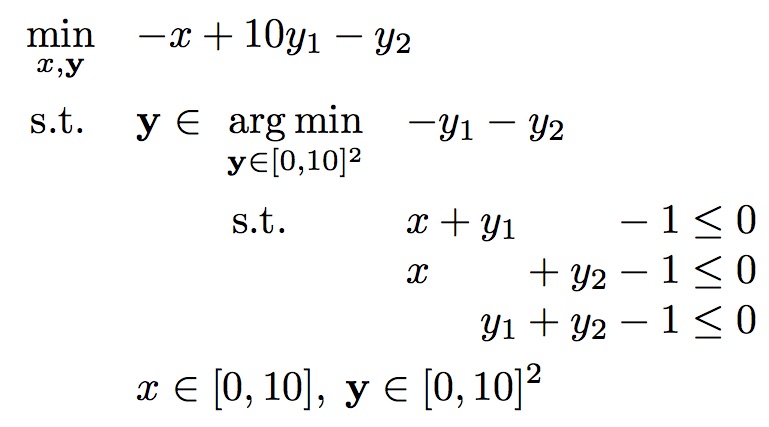b_1991_01 : Linear-Linear problem from [Bard, 1991]:

Comments on the problem
First, let us note that our formulation is based on the original source (Bard, 1991), i.e., the first constraint is x + y1 - 1 <= 0 whereas in the further sources it was changed into x - y1 - 1 <= 0. However, this does not have an impact on the optimal solution.
Moreover, in (Bard, 1998) & (Shimizu et al., 1997) wrong minimum value of outer-objective F* = 1.0 is reported, which actually is F* = -1.0.
The leader is faced with an ambiguous situation for all choices but one. Only at x = 1 is the follower’s response, y = (0.000, 0.000), unique. For 0 <= x < 1, F* = -1.0 is realized only when the follower cooperates and picks the largest possible value for y2, such that x + y2 = 1. Finally, note, that x = 0, y = (0.000, 1.000) is the best outcome from the follower’s perspective f* = -1.0, while keeping the same mimum value F* = -1.0 for the leader.
Optimal solution
| Objective values | Solution points |
|---|---|
| F* = -1.000 | x* = 1.000 |
| f* = 0.000 | y* = (0.000, 0.000) |
Sources where this problem occurs
Original source:
- Example 2.2 in (Bard, 1991)
Other sources:
- Example 8.1.2 in (Bard, 1998)
- Example 15.1.2 in (Shimizu et al., 1997)
- Test Problem 5 from Section 9.2.6 in (Floudas et al., 1999)
Description of the problem in the AMPL format
var x >= 0, <= 10; # Outer variable
var y{1..2} >= 0, <= 10; # Inner variable
var l{1..7} >= 0, <= 10; # KKT Multipliers
minimize outer_obj: -x + 10*y[1] - y[2]; # Outer objective
subject to
# Inner objective:
inner_obj: -y[1] - y[2] = 0;
# Inner constraints
inner_con1: x + y[1] - 1 <= 0;
inner_con2: x + y[2] - 1 <= 0;
inner_con3: y[1] + y[2] - 1 <= 0;
# KKT conditions:
stationarity_1: -1 + l[1] + l[3] - l[4] + l[5] = 0;
stationarity_2: -1 + l[2] + l[3] - l[6] + l[7] = 0;
complementarity_1: l[1]*(x + y[1] - 1) = 0;
complementarity_2: l[2]*(x + y[2] - 1) = 0;
complementarity_3: l[3]*(y[1] + y[2] - 1) = 0;
complementarity_4: l[4]*y[1] = 0;
complementarity_5: l[5]*(y[1] - 10) = 0;
complementarity_6: l[6]*y[2] = 0;
complementarity_7: l[7]*(y[2] - 10) = 0;
References
- J. F. Bard, Some properties of the bilevel programming problem, Journal of optimization theory and applications, 68 (1991), pp. 371–378
- J. F. Bard, Practical Bilevel Optimization, vol. 30 of Nonconvex Optimization and Its Applications, Springer US, 1998
- Floudas, C. A., Pardalos, P. M., Adjiman, C., Esposito, W. R., Gümüs, Z. H., Harding, S. T., … & Schweiger, C. A. (2013). Handbook of test problems in local and global optimization (Vol. 33). Springer Science & Business Media
- K. Shimizu, Y. Ishizuka, and J. F. Bard, Nondifferentiable and Two-Level Mathematical Programming, vol. 102, Kluwer Academic Publishers, Boston, 1997